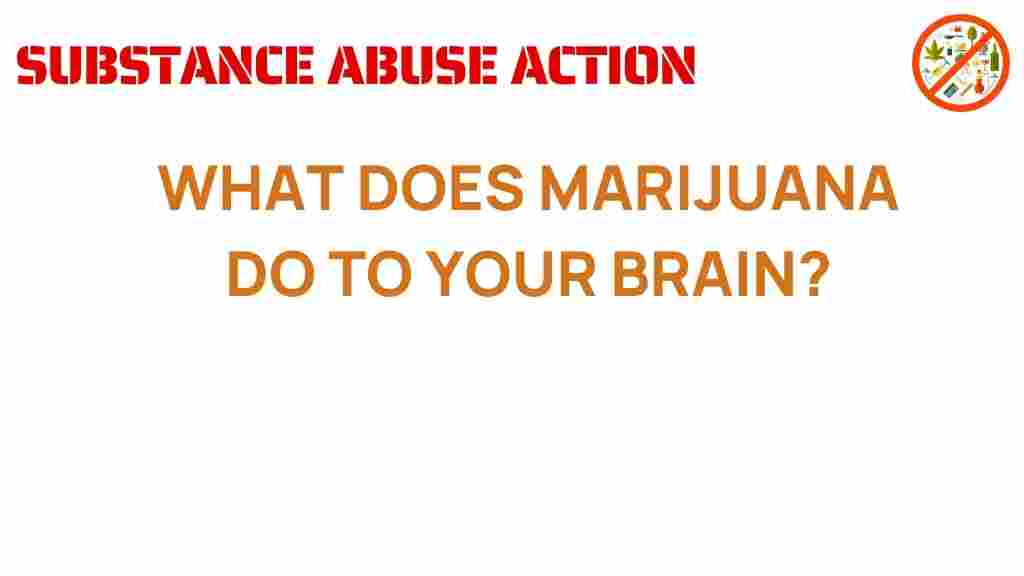Unpacking the Effects: What Does Marijuana Do to Your Brain?
Marijuana, often hailed for its medicinal properties and recreational use, has become a topic of intense discussion regarding its brain effects. As research continues to evolve, understanding how marijuana interacts with the brain is crucial, especially concerning mental health, addiction, and cognition. This article aims to explore the neurobiology of marijuana, focusing on its active compound THC, and how it can affect cognitive functions and mental well-being.
The Neurobiology of Marijuana
Marijuana primarily affects the brain through its components known as cannabinoids, with tetrahydrocannabinol (THC) being the most well-known. THC binds to cannabinoid receptors in the brain, which are part of the endocannabinoid system. This system plays a vital role in regulating various physiological processes, including mood, memory, and pain perception.
When THC is introduced into the body, it leads to a cascade of effects, including:
- Euphoria: Often referred to as a “high,” this feeling is due to the stimulation of dopamine release.
- Altered Perception: Users may experience changes in sensory perception, impacting how they see, hear, and feel.
- Impaired Memory: Short-term memory can be affected, making it difficult to learn new information.
- Increased Appetite: Commonly known as “the munchies,” THC can stimulate appetite significantly.
The Impact of THC on Cognition
Research indicates that marijuana can have both short-term and long-term effects on cognition. While some users report enhanced creativity and introspection, studies show potential downsides, particularly with chronic use. Here are key points regarding cognition and THC:
- Short-Term Effects: Users might experience impaired attention, memory, and decision-making capabilities during intoxication.
- Long-Term Effects: Chronic use, especially when initiated during adolescence, may lead to lasting cognitive decline and increased risk of mental health issues.
Marijuana and Mental Health
The relationship between marijuana and mental health is complex. While some individuals use marijuana to alleviate symptoms of anxiety or depression, research has shown that it can also exacerbate these conditions in others. Here’s a breakdown of how marijuana interacts with mental health:
- Anxiety and Depression: Some studies suggest that marijuana can provide temporary relief but may lead to increased anxiety or depressive symptoms in the long run.
- Psychosis Risk: High-potency strains of marijuana, particularly those with high THC levels, are associated with an increased risk of psychosis, especially in genetically predisposed individuals.
- Stress Management: For some, marijuana can serve as a coping mechanism for stress, but reliance on it can hinder the development of healthy coping strategies.
Understanding Addiction and Recovery
Marijuana can be addictive for some individuals, as evidenced by the development of cannabis use disorder. Understanding the addiction potential is essential for those using marijuana recreationally or medicinally. Key points to consider include:
- Frequency of Use: The likelihood of developing an addiction increases with the frequency of use, particularly in adolescents.
- Withdrawal Symptoms: Some users may experience withdrawal symptoms such as irritability, insomnia, and loss of appetite when they stop using marijuana.
- Treatment Options: Various treatment options are available for those struggling with cannabis use disorder, including therapy and support groups.
Research on Marijuana and the Brain
Ongoing research continues to shed light on the effects of marijuana on the brain. Some significant findings include:
- Impact on the Developing Brain: Studies show that marijuana use during adolescence can affect brain development, leading to cognitive impairments.
- Potential Therapeutic Uses: Research indicates that cannabinoids may have therapeutic properties for conditions such as chronic pain, epilepsy, and PTSD.
- Neuroprotective Effects: Some studies suggest that cannabinoids may have neuroprotective effects, potentially benefiting conditions like Alzheimer’s disease.
For those considering marijuana for recreational or medicinal purposes, it is crucial to navigate its use mindfully. Here’s a step-by-step guide:
- Educate Yourself: Understand the strains, THC levels, and potential effects on your brain and mental health.
- Consult a Professional: If using marijuana for medical purposes, speak with a healthcare professional to discuss potential benefits and risks.
- Monitor Use: Keep track of how marijuana affects your mood, cognition, and overall mental well-being.
- Explore Alternatives: Consider other treatment options for mental health issues, such as therapy or medication.
- Seek Support: If you find yourself relying on marijuana, consider joining a support group or seeking professional help.
Troubleshooting Tips for Marijuana Users
If you or someone you know is experiencing negative effects from marijuana use, consider the following troubleshooting tips:
- Recognize Patterns: Identify triggers that lead to excessive use and work to avoid them.
- Limit Frequency: If you use marijuana regularly, try to reduce the frequency to assess its impact on your mental health.
- Engage in Activities: Find alternative activities that promote well-being, such as exercise, meditation, or hobbies.
- Talk to Someone: Reach out to friends, family, or professionals to discuss your experiences and feelings.
Conclusion
Understanding the effects of marijuana on the brain is essential for anyone considering its use, whether for recreational or medicinal purposes. While marijuana can offer benefits, particularly in terms of pain relief and anxiety management, it also carries risks, particularly regarding cognition and mental health. By staying informed and making mindful choices, users can navigate the complexities of marijuana use more effectively. For further reading on the neurobiology of marijuana, explore this resource. Always consult with a healthcare professional if you have concerns about marijuana and its impact on your brain and mental health.
For those struggling with addiction or seeking recovery, know that help is available, and reaching out is the first step toward a healthier future.
This article is in the category Health and created by SubstanceAbuseAction Team
